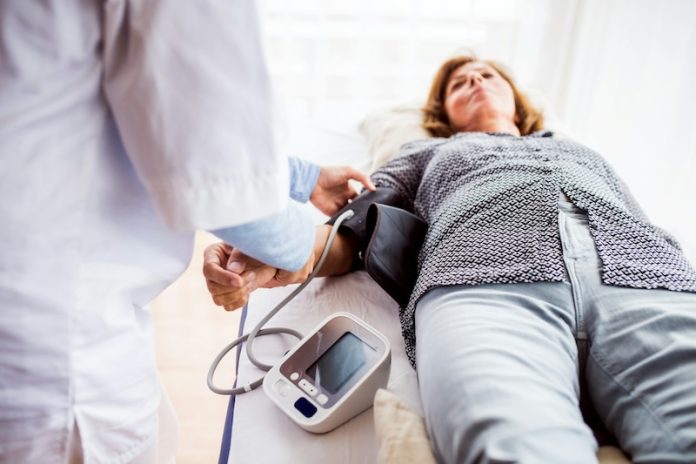
High blood pressure, or hypertension, is often called the “silent killer” because it can quietly cause harm to the body over years without noticeable symptoms.
This condition affects millions of women around the world, and it’s a leading cause of heart disease, stroke, and kidney problems.
However, recognizing the symptoms in women can be challenging, as they may differ slightly from those seen in men, and some symptoms can be subtle or mistaken for other health issues. Understanding what signs to look for is key to managing blood pressure and protecting long-term health.
Many women with high blood pressure may not notice any symptoms until the condition becomes severe.
This is why regular blood pressure checks are important, especially as women age or go through life changes, such as pregnancy or menopause, that can impact blood pressure.
Research shows that hormonal changes during these stages can raise the risk of hypertension, and symptoms can be more pronounced or unique for women.
Some of the symptoms women may experience include headaches, particularly at the back of the head or during early mornings.
While everyone gets headaches from time to time, studies suggest that high blood pressure can cause more intense headaches that don’t go away easily and may be accompanied by feelings of pressure or throbbing.
Researchers believe that high blood pressure can affect blood flow to the brain, which may lead to these persistent headaches.
Another symptom to watch for is dizziness or a feeling of being off-balance. Although dizziness can have many causes, it’s often linked to high blood pressure in women. When blood pressure rises, it can affect circulation, making it harder for oxygen-rich blood to reach the brain.
This can cause dizziness, lightheadedness, and, in severe cases, even fainting. If you experience dizziness frequently, especially when standing up or moving around, it’s worth discussing it with a healthcare provider.
Women with high blood pressure may also feel more fatigued or generally unwell. Fatigue is a common complaint, and it’s easy to overlook, but it can be a sign that blood pressure is straining the heart and other organs.
Studies have found that women with hypertension report feeling unusually tired, sluggish, or weak. This may happen because high blood pressure forces the heart to work harder to pump blood, which can wear it out over time.
Fatigue related to high blood pressure is often persistent and doesn’t improve with rest, making it different from everyday tiredness.
Shortness of breath can also signal high blood pressure, especially if it occurs without obvious physical exertion. High blood pressure can lead to changes in the arteries, causing the heart to pump less efficiently.
As a result, women might feel out of breath more easily, even during light activities. This symptom is sometimes mistaken for general aging or lack of fitness, but it can be a sign of hypertension that should not be ignored.
In some cases, high blood pressure can also cause chest pain, although this symptom is more commonly associated with men. Women with hypertension might feel pressure or discomfort in their chest, which could be linked to an increased workload on the heart.
However, chest pain or pressure is a serious symptom, as it can also indicate a heart attack. Research shows that women often experience different or less obvious heart attack symptoms than men, which can make it challenging to identify.
If you have high blood pressure and experience chest discomfort, it’s crucial to seek medical attention.
Blurred or double vision can be another symptom. High blood pressure can cause damage to the blood vessels in the eyes, which affects vision. Women with high blood pressure might notice changes in their eyesight, such as blurred or double vision, especially when blood pressure spikes.
Studies have shown that hypertension-related eye issues can develop over time, so regular eye exams are important to catch any early signs of damage.
Finally, research highlights that during pregnancy, some women may experience high blood pressure as part of a condition known as preeclampsia. Preeclampsia is a serious complication marked by high blood pressure and signs of damage to organs, usually the kidneys or liver.
Symptoms of preeclampsia can include swelling in the hands and face, sudden weight gain, severe headaches, and vision changes. Because this condition poses risks for both the mother and baby, monitoring blood pressure during pregnancy is essential.
In conclusion, while high blood pressure is often symptomless, women should pay attention to possible warning signs like headaches, dizziness, fatigue, shortness of breath, chest discomfort, and vision changes.
These symptoms are often overlooked or mistaken for other conditions, so regular blood pressure checks are key.
By understanding these potential signs and checking blood pressure regularly, women can take proactive steps to protect their health and catch any issues early before they lead to more serious problems.
If you care about blood pressure, please read studies about unhealthy habits that could increase high blood pressure risk, and eating eggs in a healthy diet may reduce risks of diabetes, high blood pressure.
For more information about blood pressure, please see recent studies that early time-restricted eating could help improve blood pressure, and results showing 12 foods that lower blood pressure.
Copyright © 2024 Knowridge Science Report. All rights reserved.



